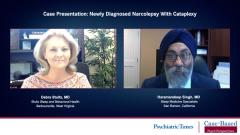
Case Presentation: Schizoaffective Disorder with Narcolepsy
In this custom video series, Haramandeep Singh, MD, and Debra Stultz, MD, discuss a case involving a 23-year-old man with schizoaffective disorder and newly diagnosed narcolepsy.
Episodes in this series

Haramandeep Singh, MD: Let’s go on to our next case. This is a little more complicated, but it’s a real-world scenario. I’ll describe the case to you. This is a 23-year-old man with a diagnosis of schizoaffective disorder. He was diagnosed a few years back. He had hypnagogic hallucinations while falling asleep and getting up from sleep, in addition to possible delusions. At that point, the diagnosis of schizoaffective disorder was made, and he was started on olanzapine, which improved his psychotic symptoms, but he continued to be sleepy and have sleep fragmentation at night. He continued to wake up a lot and have a hard time going back to sleep. He had frequent awakenings. He was then referred for additional medical evaluation and testing, and at that point, they made a diagnosis of narcolepsy. He had a PSG [polysomnography] and MSLT [multiple sleep latency test], and then diagnosis was made.
We’ve heard this type of case before, in which people have psychiatric symptoms, comorbidities, depression, anxiety, and sometimes hallucinations and are diagnosed with psychiatric disorder. But is narcolepsy comorbid with that psychiatric disorder? Is it the main diagnosis? That’s what we’re trying to figure out in this particular patient. I’d love to hear your overall impressions about this case as well.
Debra Stultz, MD: Right. It’s interesting. Narcolepsy is often misdiagnosed as schizophrenia, especially in the younger kids, because you’re hearing voices and stuff. But those 2 can co-occur, and you may have symptoms of both disorders, like in this case. It’s very interesting. It’s important to get the history of when the symptoms started and what was going on with the patient, along with family history to help you make the differential of whether it’s truly a psychiatric disorder or narcolepsy.
Narcolepsy runs hand-in-hand with multiple psychiatric disorders. The studies on schizophrenia and narcolepsy are pretty varied. Most of the studies say anywhere from 4% to 8% of people with schizophrenia can have narcolepsy. Some studies have said up to 14%. It’s important for us to start thinking about that and look for those symptoms in our patients with schizophrenia. I don’t treat a lot of schizophrenia in my office because of the nature of the practice that I have, but that’s a great point for us to make to the mental health centers and to be educating them about what to look for.
Haramandeep Singh, MD: I can’t say it enough in terms of the misdiagnosis. What happens is a lot of these patients present with psychiatric symptoms like hallucinations and then get funneled, and that’s all we think about. We forget about the daytime sleepiness and the fatigue that’s happening over the years. We need to try to focus in on that part of our history too, and figure out if this person has a sleep disorder and if that’s what we need to target. If we can educate practitioners and say, “Let’s look at getting sleep evaluated as well,” it will be beneficial for patient diagnosis and long-term outcomes.
Debra Stultz, MD: Absolutely. That’s why I love doing these teaching talks, because we really have to educate people about all sleep disorders. Especially narcolepsy—in our own practices and in our own psychology and neurology fields—because it’s missed. It’s sometimes hard. If you look at schizophrenia and narcolepsy, they both can have sleepiness. Schizophrenics can be very sleepy just from the medicines they’re on or the illness they have. It may be that they have other sleep disorders, because patients with schizophrenia can have restless leg syndrome and periodic limb movement disorder, just like patients with narcolepsy can have. Some of the medications that they’re on can cause restless leg syndrome and periodic limb movement disorder, so there may be other sleep disorders.
The hallucinations can be different and help you decide which 1 it is. If the hallucinations are more with going to sleep or coming from sleep, then you need to start thinking of narcolepsy. It wouldn’t just be at night, because patients with narcolepsy have naps during the day and fall asleep unintentionally, so they can have some hallucinations that occur during the day. You can’t just say hallucinations at night might be narcolepsy. But if it’s associated with a sleep period, then you might be thinking more narcolepsy.
When patients with schizophrenia hallucinate, they’re more auditory and associated with delusions. There are some other psychiatric symptoms. With patients with narcolepsy who have hypnagogic or hypnopompic hallucinations, they’re often visual or tactile. Patients will tell me they feel something, or they’re floating, or there’s a sense of rushing or looking from above. The narcolepsy hallucinations are often of a different type from the auditory condemning hallucinations of schizophrenia, and that may help you look toward if it’s 1 or the other.
Haramandeep Singh, MD: Excellent points. I really appreciate that, because it can absolutely help in clarifying the diagnosis and appropriate treatment.
Transcript edited for clarity.
Disclosures:
Dr Stultz has disclosed that she serves as a consultant on the advisory board for Harmony Biosciences and that she receives support in her role with the speaker’s bureau for Harmony Biosciences and Jazz Pharmaceuticals.
Dr Singh has disclosed that he serves as a consultant and receives support in his role with the speaker's bureau for Jazz Pharmaceuticals and Harmony Biosciences.
Newsletter
Receive trusted psychiatric news, expert analysis, and clinical insights — subscribe today to support your practice and your patients.








